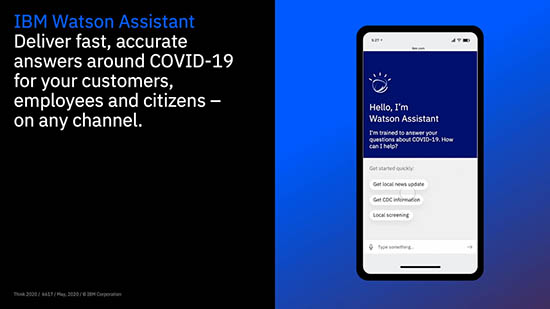THINK 2020 stories
Rob Thomas: AI, Automation Move to the Fore Amid Pandemic
By Diane Cardwell
May 6, 2020

Watch highlights from Rob Thomas's keynote at Think Digital
Companies that don’t invest in AI and cloud computing will find themselves at a profound competitive disadvantage, executives said Wednesday during a keynote presentation by Rob Thomas, Senior Vice President, IBM Cloud & Data Platform.
It’s a disadvantage the COVID-19 crisis is making all the more clear.
“I like to think the crisis we’re dealing with, it’s going to accelerate perhaps what was going to happen anyway—that’s the opportunity in front of all of us,” Thomas said in his keynote address, “Act, Don’t React: How AI and Automation Will Change the Way You Work,” delivered online at IBM’s Think Digital conference.
→ Watch a replay of Rob Thomas's complete Think Digital keynote
Before the pandemic, companies that had been most focused on adopting AI to transform business processes and information technology were seeing their annual revenue growth outperform industry peers by 165 percent, Thomas said.
To help continue that momentum, Thomas announced a new IBM product, Watson AIOps, designed to make IT systems and infrastructures more resilient. IT downtime means lost revenue, he said. The solution lies in a combination of using AI and predictive tools not only to help prevent problems but also to fix them quickly when they occur.
“It’s trained to connect the dots across data sources and tools in real time, helping to quickly detect and diagnose issues,” Jessica Rockwood, IBM Vice President of Development, Data and AI, said of the application, which is based on more than 100 IBM Research patents.
The announcement follows other recent AI innovations like Watson Assistant for Citizens, a customer-service agent that has been adopted by organizations and governments at all levels to help keep people informed about the pandemic while freeing workers to focus on other important tasks. Designed to respond to the most common COVID-19 queries, it is based on IBM’s AI-enabled Watson Assistant, already in use by businesses around the world.

Watson Assistant for Citizens has allowed companies to rapidly build virtual agents for COVID-19 queries
Clients Attest to the AI Advantage
As part of the presentation, IBM clients offered examples of how they’re already using IBM Watson in their operations.
At the airlines operator Lufthansa, the desire to make better use its vast of amounts of traveler data—and pressure from new employees demanding more from technology—led to an evolving program of using AI, said Mirco Bharpalania, head of Data & Analytics, Lufthansa Group.
“We truly believe that if we provide the right data at the right point in time, enhanced with AI and analytics, we provide an even better experience for our customers,” Bharpalania said. “But we also help our employees to make the right decisions.” That includes long-term planning like where to expand their network, he said, and short-term choices like whether to wait for passengers transferring from a delayed flight.
At UPS, using AI has helped design ways of managing real-time data to cut costs and boost efficiency. “Getting that culture of innovation is something that we see as key for the future of AI and data science at UPS,” said Mallory Freeman, director of Data Science and Machine Learning, United Parcel Service Advanced Analytics Group.
That has meant building tools that aid in everything from managing customs costs to providing delivery drivers with better routes, Freeman said. Through its smart logistics networks, for instance, UPS is saving about 100 million miles each year, which conserves 10 million gallons of fuel and $50 million.
And for PayPal, a Watson-enabled chatbot has become the first point of contact for many customers, as the customer service team has gone from taking calls at the office to working from home, said Melissa Molstad, director of Common Platforms, Data Strategy & Vendor Relations, PayPal.
“The virtual assistant is handling about 1.25 million conversations per month, and this continues to increase,” Molstad said. “With the changing times, the ability for us to pivot has been extremely powerful.”
Partners See Permanent Changes in Work Culture
IBM partners said the nature of work may never be the same, even once people return to their offices. But those organizations that invest in AI and automation will be ahead of the pack.
“We’re going to see an era of haves and have-nots in business,” said Aaron Levie, chief executive and cofounder of the documents management provider Box. The difference, he said, won’t be based on typical factors like who has more money, but on who was thinking about automation, AI and the ability to serve customers digitally.
“The companies that get ahead of that—the companies that invest in those kinds of approaches, whether it’s for their workplace or for their core operations—those will be the companies that can thrive and continue to scale,” said Levie.
Stewart Butterfield, chief executive and cofounder of the collaboration software company Slack, echoed that thought.
“If you’re entirely dependent on in-person meetings and email in order to make decisions and evaluate progress and communicate,” Butterfield said, “it’s a pretty rough transition.”
But the crisis has created the incentive for “deliberately making some changes,” he added. “So, hopefully for some companies, they actually come out with a better working culture on the other side of this.”